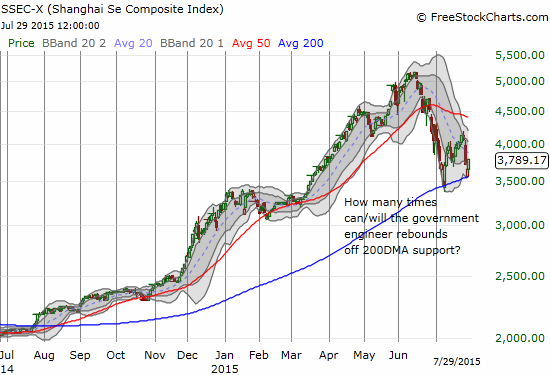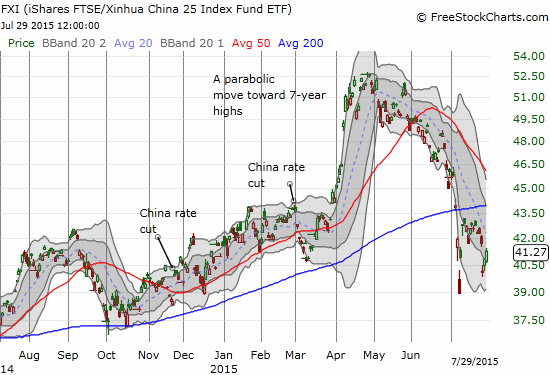On July 29, 2015, Nightly Business Report included a poignant segment featuring the painful story of a busted stock trader in China. The path from hope (greed?) to despair sounds like a classic with a twist. At least this particular trader took too many cues from the Chinese government, a government whose policies have clearly help lead many ordinary citizens to ruin.
We are accustomed to hearing market stories in the aggregate. Pundits and analysts debate the faceless numbers and wrangle over the significance or insignificance of the collective pain to the larger collective of the Chinese and global economy. I find it worthwhile to pause at least a moment and appreciate that real people with real pain suffer behind the spectacular headlines.
I recommend watching the few minutes of video (see below for the clip). If you just want a quick skim, I provide some key bullet points below with some editorial.

Source: Nightly Business Report
- There are 90 million retail investors in China. That is small in China, but that is equal to 4.5x the entire population of New York and almost 30% of the population in the U.S.
- Rural farmer Yang Cheng from SW China began trading in 2008. Given he must have directly experienced the frightening volatility of the financial crisis, I would have assumed he learned very valuable lessons, VERY quickly. Apparently not.
- Traditionally, the average Chinese citizen shuns the stock market as it is considered an unreliable investment. Surely the financial crisis cemented that attitude among many.
- This attitude changed in 2014 when the government started promoting stocks as part of a grand plan to open markets and expand the economy. NOW I understand why the Shanghai Composite Index (SSEC) exploded to the upside even as China’s growth was starting to slow! As part of its desperation to stoke growth, I assume China viewed its moribund stock market as a potential lever for papering over a slowing economic engine.
- In response, Cheng invested $64K in the market AND the money of his relatives….he bet it ALL on ONE local mining company. In other words, Cheng went full throttle into commodity-related play just ahead of a massive and historic acceleration in the worldwide collapse in commodities.
- Cheng claimed that when the market (presumably the Shanghai Composite) hit 4000, he realized the risks were pretty high. So, I find it odd that he did not proceed to cash out and lock in at least some of his gains. Perhaps commodities were already lagging in China and Cheng was waiting for his investment to catch up? Some more details here would have been VERY helpful.
- What IS clear is that Cheng became swayed by public opinion on government policies. He said these opinions effected his judgment. I assume this claim means that the public was generally in loud approval of the government’s stock promotion game. The government had animated the herd and the groupthink hysteria was well underway.
- Cheng’s demise began after his broker convinced him to try margin trading. He took his approximately $200K portfolio and leveraged up to $1M of buying power!!!
- When the market broke down in early July, Cheng’s broker forced him to liquidate. Cheng was left with a DEBT of $200K. This is a classic tale of letting greed replace one’s better judgment. Perhaps in time Cheng will understand that the government, public opinion, and his broker are not the only ones at fault.
- Cheng bought a train ticket to Beijing to visit with the regulator of the stock market. He was turned away in what may be the last time he ever believes his government will help manage and improve his life. NBR implied that many other investors have attempted similar trips in search of relief.
This final quote sums up the tragedy and the pain:
“I don’t know what to do. I trusted the government too much. I won’t touch stocks again….I have ruined everyone in my family.”
The irony of Cheng’s pain is that the index is still well above where he went all in. This story is another reminder that we outsiders should find little comfort in the fact that the stock market still has healthy year-to-date and year-over-year gains. We can only imagine the massiveness of the mounting losses if the Chinese government fails to keep this game propped up.

Here in the U.S., Cheng’s capitulation is the kind of pain that makes Wall Street salivate. Bigger and better capitalized investors and traders take this opportunity to pick up the pieces and find incredible value where once the panicked and hapless were forced out of the game. For now, China’s government is effectively playing that role, and the big fish have to be just as scared as regular investors given the draconian limits China has placed on trading.

Source for charts: FreeStockCharts.com
Be careful out there!

Are there any parallels between this segment and the 1920’s crash in the US? I summarize the US 1920’s market fueled by the multi-generational savings investor who much like Mr. Cheng felt it safe & patriotic move. Now the turn of the 21st century 2000’s crash was largely fueled by easy access to very cheap money. When add all of the major super structure construction in China of entirely functional empty cities, to Cheng’s story, it looks like Ponzi is a key advisor driving Chinese economic development.
ps nice site
A very good piece of writing. My reaction to this story is twofold:
Mr. Cheng was motivated by greed: he wanted to become wealthy quickly. He borrowed money to do so, and let’s face it, that is a fundamentally dishonest way to get rich. I think he got nothing worse than he deserved.
In contrast, millions of Americans lost their jobs and subsequently their homes between 2008 and 2012, who did nothing wrong at all, and didn’t even have a misplaced trust in the government. Many who lost their homes had routine 30-year mortgages for which they had adequate income and a reasonable expectation their employment would continue.
Personally I’m far more sympathetic to them than to anyone who gets wiped out chasing wealth.
Yes, in a relative world, folks losing their homes by no fault or action of their own is far more tragic. But I wrote this from a stock market trading perspective to demonstrate errors of judgement that can lead to ruin. I am also implicitly (explicitly) calling out the Chinese government for helping to string along people willing to chase their greed in this way. I really feel like the Chinese govt used its people as pawns in this whole racket!
And thanks for the kudos!
There are definite parallels, but China is nowhere near a 1929-style crash. Not yet yet anyway. Fortunately, the Chinese economy is not dependent on the stock market, so it could go poof and China would still avoid a depression (it would still HURT!). I just hate seeing the government take advantage of people’s greed in this way to try to pursue an economic strategy and plan.